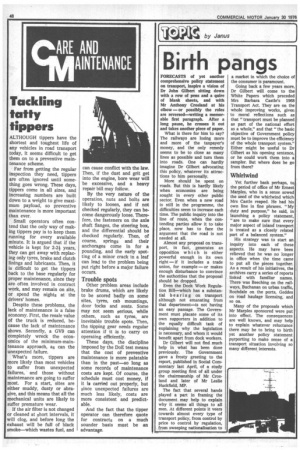Birth pangs
Page 54

If you've noticed an error in this article please click here to report it so we can fix it.
FORECASTS of yet another comprehensive policy statement on transport, inspire a vision of Dr John Gilbert sitting down with a row of pens and a quire of blank sheets, and with Mr Anthony Crosland at his elbow or possibly the roles are reversed—writing a memorable first paragraph. After a long pause, he crosses it out and takes another piece of paper.
What is there for him to say? The railways are losing more and more of the taxpayer's money, and the only remedy seems to be to close as many lines as possible and turn them into roads. One can hardly imagine Dr Gilbert advocating this policy, whatever its attractions to him personally.
More should be spent on roads. But this is hardly likely when economies are being sought in every other public sector. Even when a new road is still in the programme, the difficulties seem to increase each time. The public inquiry into the line of route, when the contending parties allow it to take place, now has to face the argument that the road is not needed at all.
Almost any proposal on transport, in fact, generates an opposition which is either powerful enough in its own right — if it includes a trade union, for example — or makes enough disturbance to convince the authorities that the proposal should be dropped.
Even the Dock Work Regulation Bill—which has a substantial bearing on transport although not emanating from that department—is not having an easy passage. The Government must placate some of its own supporters in addition to the equally difficult task of explaining why the legislation is necessary, and whom it would benefit apart from dock workers.
Dr Gilbert will not find much help in what has been done previously. The Government gave a frosty greeting to the report, published in Social Commentary last April, of a study group meeting first of all under the chairmanship of Mr Crosland and later of Mr Leslie Huckfield, MR The fact that several hands played a part in framing the document may help to explain why it seems all things to all men. At different points it veers towards almost every type of transport policy, from control by price to control by regulation, from sweeping nationalisation to a market in which the choice of the consumer is paramount.
Going back a few years more, Dr Gilbert will come to the White Papers which preceded Mrs Barbara Castle's 1968 Transport Act. They are on the whole improving works, given to moral reflections such as that "transport must be planned as part of the national effort as a whole," and that "the basic objective of Government policy must be to improve the efficiency of the whole transport system." Either might be useful to Dr Gilbert as his opening sentence, or he could work them into a sampler. But where does he go from there?
Whirlwind
Yet further back perhaps, to, the period of office of Mr Ernest Marples, who in a sense sowed the seed of the whirlwind which Mrs Castle reaped. He had his own line in fine phrases. "My • duty and purpose," he said, in launching a policy statement, "are to make sure that every major aspect of inland transport is treated as a closely related part of a balanced system."
His strategy was to start an inquiry into each of these aspects. He may have been relieved that he was no longer in office when the time came to put all the pieces together. As a result of his initiatives, the archives carry a series of reports linked with familiar names. There was Beeching on the railways, Buchanan on urban traffic, Rochdale on the ports, Geddes on road haulage licensing, and so on.
Many of the proposals which Mr Marples sponsored were put into effect. The consequences are well known, and may help to explain whatever reluctance there may be to bring to birth yet another policy statement purporting to make sense of a transport situation involving so many different interests.
































































































